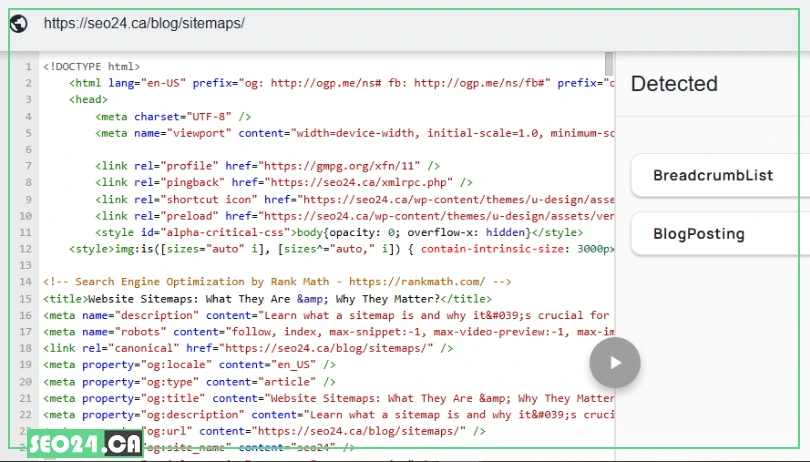
Structured Data Testing Tools
Structured data testing tools are the secret weapon for anyone looking to boost their website’s presence in search results. By ensuring your schema markup is accurate and error-free, these tools help unlock rich results that attract more clicks and improve SEO. In this blog, we’ll explore the top tools you need to find and fix schema markup errors effectively.
Table of Contents
Google’s Rich Results Test
Google’s Rich Results Test is a widely used tool designed to help website owners, developers, and SEO professionals validate and preview their structured data implementation. It’s an essential resource for anyone aiming to optimize their content for enhanced visibility in Google Search.
Purpose: The primary purpose of the Rich Results Test is to check whether a page is eligible for rich results, enhanced listings in Google Search that go beyond the standard blue link. These include review stars, event details, FAQs, how-to previews, and more. By identifying which rich result types a page qualifies for, the tool helps ensure that your schema markup is implemented correctly and follows Google’s guidelines.
Here are the features:
- Supports both URL and code snippet testing (HTML or JSON-LD).
- Detects structured data errors and warnings, along with missing or invalid fields.
- Shows a preview of eligible rich results for Google Search.
- Works across both mobile and desktop rendering.
- Offers diagnostic recommendations to help you fix common schema mistakes.
- Focuses solely on Google-supported schema types relevant to search features.
How to Use It? Using the tool is simple:
- Visit the Rich Results Test page.
- Enter your URL or paste your code snippet.
- Click “Test URL” or “Test Code.”
- Wait for the scan to complete, then review the detected rich results types, any warnings or errors, and the preview output.
Errors mean your page won’t qualify for rich results, while warnings indicate optional improvements. The tool provides a direct breakdown of what to fix.
When to Use:
- When implementing or updating schema markup on a webpage.
- Before launching a new page or template that includes structured data.
- As a debugging tool when rich snippets are not appearing in search results.
- During routine SEO audits to ensure markup stays compliant with updates to Google’s structured data policies.
Schema Markup Validator
The Schema Markup Validator is one of the free structured data testing tools provided by Schema.org, designed to help you validate your structured data against the official schema vocabulary. While it doesn’t focus on Google-specific features, it plays a crucial role in ensuring your markup is syntactically correct and semantically meaningful according to Schema.org standards.
Purpose: The main goal of the Schema Markup Validator is to check whether your structured data markup follows the correct schema syntax. Unlike Google’s Rich Results Test, which only tests for rich result eligibility, this tool validates any type of schema, whether or not it’s supported by search engines. It’s ideal for developers working with a wide range of data types beyond just SEO.
Here’re the main features:
- Supports validation of JSON-LD, Microdata, and RDFa formats.
- Accepts both URL input and raw code snippets.
- Highlights syntax errors and missing required fields.
- Displays a structured, easy-to-read data tree view of the markup.
- Completely independent of any specific search engine requirements.
- Supports the entire Schema.org vocabulary, making it useful for non-Google use cases like Bing, Yandex, or internal applications.
How to Use It:
- Go to the Schema Markup Validator.
- Enter the URL of your webpage or paste your structured data code.
- Click the “Run Test” or similar button.
- Review the validation results, which will show:
- Correctly parsed structured data.
- Any errors or warnings with exact locations and messages.
- A collapsible tree structure to explore data entities and properties.
This tool does not preview rich results; it focuses purely on the integrity and completeness of the markup.
When to Use:
- When working with non-Google schema types like Book, MedicalCondition, Organization, etc.
- For cross-platform SEO or when optimizing for other search engines like Bing or Yandex.
- During development and QA to verify that all structured data follows Schema.org rules.
- To complement Google’s Rich Results Test by ensuring broader schema correctness even for non-supported types.
Using schema markup testing tools effectively requires more than just running a test; it takes technical expertise to implement, troubleshoot, and optimize schema markup correctly. Even small mistakes can prevent your site from appearing with rich results in search.
💡 If you want to make sure your structured data is set up properly and delivering real SEO value, explore our SEO service in Toronto and get professional support to maximize your site’s visibility and search performance.
Other Valuable Structured Data Testing Tools
While Google’s Rich Results Test and the Schema Markup Validator are the most commonly used tools, several other platforms can assist with structured data validation, testing, and analysis. These tools can help you spot errors, experiment with new schema formats, and ensure cross-platform compatibility.
- JSON-LD Playground: A browser-based tool created by the W3C community that lets you write, test, and debug JSON-LD code interactively. It’s especially useful for experimenting with linked data structures and understanding how data is parsed and interpreted in real time.
- Bing Markup Validator: Offered by Microsoft through its Bing Webmaster Tools, this validator checks your structured data for compatibility with Bing’s indexing system. It supports schema types used in Bing’s search features and can reveal issues that Google’s tools might not catch.
- Schema App Structured Data Tester / Analyzer: This premium tool from Schema App goes beyond basic validation by offering in-depth analysis, recommendations, and visual mapping of structured data across your site. It’s useful for enterprise-level SEO and maintaining consistent, scalable schema deployment.
Conclusion
Structured data testing tools are essential for ensuring your schema markup is correctly implemented, error-free, and optimized for search engine visibility. From Google’s Rich Results Test to the Schema Markup Validator and beyond, each tool serves a specific purpose in helping your website stand out with rich, informative search listings.
By regularly using these tools, you can catch mistakes early, improve your content’s SEO performance, and stay aligned with evolving search engine standards.
Looking to get expert help with structured data implementation or a full SEO strategy? Book a consultation with our digital marketing agency in Toronto and let our specialists guide you to better rankings and richer search results.
FAQ
Use tools like Google’s Rich Results Test or Schema Markup Validator to check for errors. If no issues are found and your page qualifies, rich results may appear i
Top tools include Google Rich Results Test, Schema Markup Validator, JSON-LD Playground, and Schema App Tester. Each serves different validation needs.
Related Posts
Learn what SEO is and why it's crucial for your business. Find out how optimizing your website can boost…
by
Having a great website is just the first step. To get people to visit it, they need to be…
by
As voice search becomes more popular, it's clear that people are changing how they look for information online. Users…
by
With the rise of zero-click searches, ranking at the top of Google's search results has taken on a new…
by


